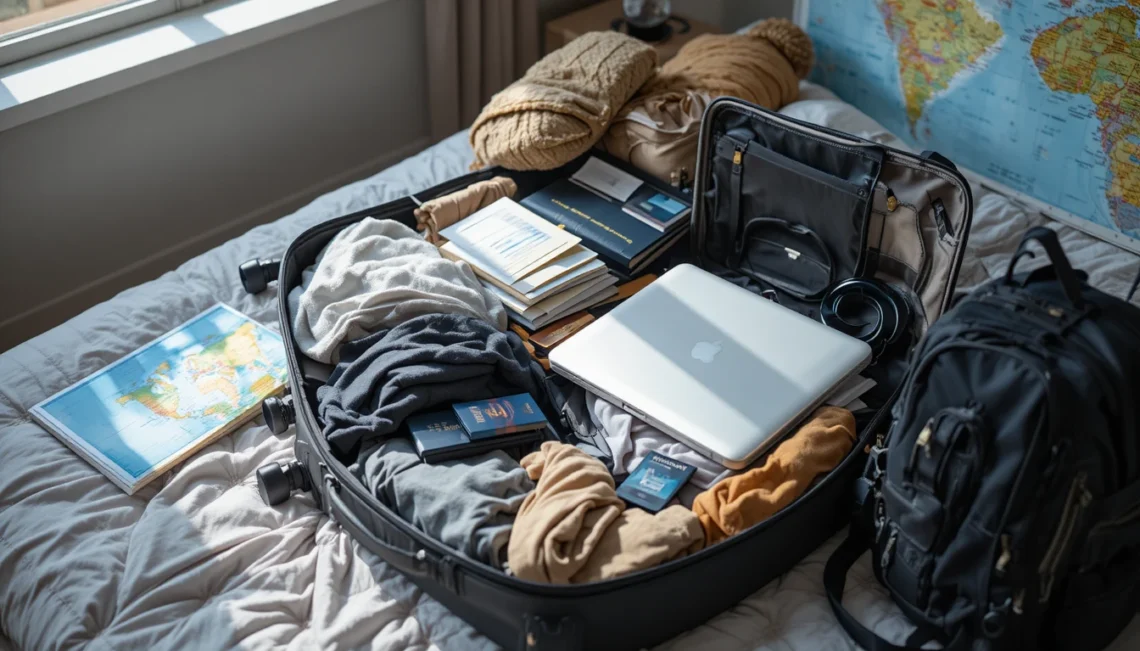Introduction
Studying abroad is a dream for many students. It gives you a chance to explore new cultures, study in world-class universities, and grow both academically and personally. But before you start your journey, it is very important to be well-prepared. Many first-time students forget essential things, which can cause stress later.
To make your journey smooth, we have created a study abroad checklist. This guide will help you know what every student must prepare before leaving.
Why Preparation is Important
- Avoids last-minute stress.
- Ensures smooth travel and settlement.
- Helps you stay focused on studies instead of worrying about missing items.
- Saves time and money in a new country.
Study Abroad Checklist: Things You Must Prepare
✅ 1. Passport and Visa
- Make sure your passport is valid for at least 6 months after your planned stay.
- Keep multiple photocopies of your passport.
- Carry your student visa approval letter and other related documents.
✅ 2. University Documents
- Admission letter / Offer letter
- Proof of tuition fee payment
- I-20 form (USA students) or CAS letter (UK students)
- Copies of academic transcripts and certificates
✅ 3. Financial Preparation
- Proof of funds (bank statements or sponsor letters)
- Debit/credit cards (international use enabled)
- Some cash in local currency of the destination country
- Scholarship confirmation letters (if any)
✅ 4. Travel Arrangements
- Book flight tickets early for cheaper rates.
- Carry flight itinerary and boarding passes.
- Arrange airport pickup if possible.
- Check baggage allowance and pack smartly.
✅ 5. Accommodation Details
- Confirm your student housing or private accommodation.
- Keep written proof of your housing contract.
- Save contact numbers of landlords or university housing office.
✅ 6. Health Preparation
- Medical checkup and vaccinations (if required).
- Carry important medicines with prescriptions.
- Buy international health insurance.
- Carry a small first-aid kit.
✅ 7. Academic Preparation
- Carry required textbooks or e-books.
- Bring a laptop and necessary study materials.
- Save digital copies of lecture notes and references.
- Learn about the academic calendar and orientation week.
✅ 8. Electronics & Gadgets
- Laptop with charger.
- Mobile phone with international roaming or unlocked for local SIM card.
- Universal travel adapter (important for different plug types).
- Headphones, power bank, USB drives.
✅ 9. Clothing and Essentials
- Pack according to the weather of your destination.
- Comfortable shoes for daily use.
- Formal clothes for interviews or events.
- Traditional clothes (for cultural events, if you like).
✅ 10. Personal Items
- Toiletries (toothpaste, soap, shampoo, etc.).
- Towel, bedsheets, pillow cover (if not provided in accommodation).
- Glasses/contact lenses with solution.
- Photos of family for comfort.
✅ 11. Emergency Contacts
- Contact list of family and friends.
- Embassy contact details of your home country.
- University emergency helpline numbers.
✅ 12. Learn Basic Local Knowledge
- Understand public transport system.
- Learn a few common phrases in the local language.
- Research the cost of living and local culture.
Tips for Packing Smartly
- Carry only what is necessary—avoid overpacking.
- Use vacuum bags to save space in luggage.
- Keep valuables like passport, visa, and money in your hand luggage.
- Label your bags with your name and destination address.
Common Mistakes to Avoid
- Forgetting to carry important documents.
- Not arranging accommodation before arrival.
- Carrying too much luggage.
- Not informing the bank about international card use.
- Ignoring health insurance.
Frequently Asked Questions (FAQs)
Q1: When should I start preparing for study abroad?
A: At least 3–4 months before your departure date.
Q2: Do I need to carry all my academic documents?
A: Carry both originals and photocopies of important certificates.
Q3: Should I buy things before leaving or after reaching abroad?
A: Carry essentials, but buy bulky items (like kitchenware) after reaching your destination.
Q4: How much cash should I carry?
A: Enough for initial expenses (1–2 weeks), but most money should be in bank cards.
Q5: Do I need travel insurance along with health insurance?
A: Yes, many countries recommend both for students.
Conclusion
Studying abroad is exciting, but preparation is the key to success. A well-planned checklist helps you avoid stress and focus on your studies. From passports and visas to health insurance and financial arrangements, every step matters.
By following this study abroad checklist, you can make sure you are fully ready for your journey. Remember, preparation today will make your new life abroad easier and more enjoyable.






